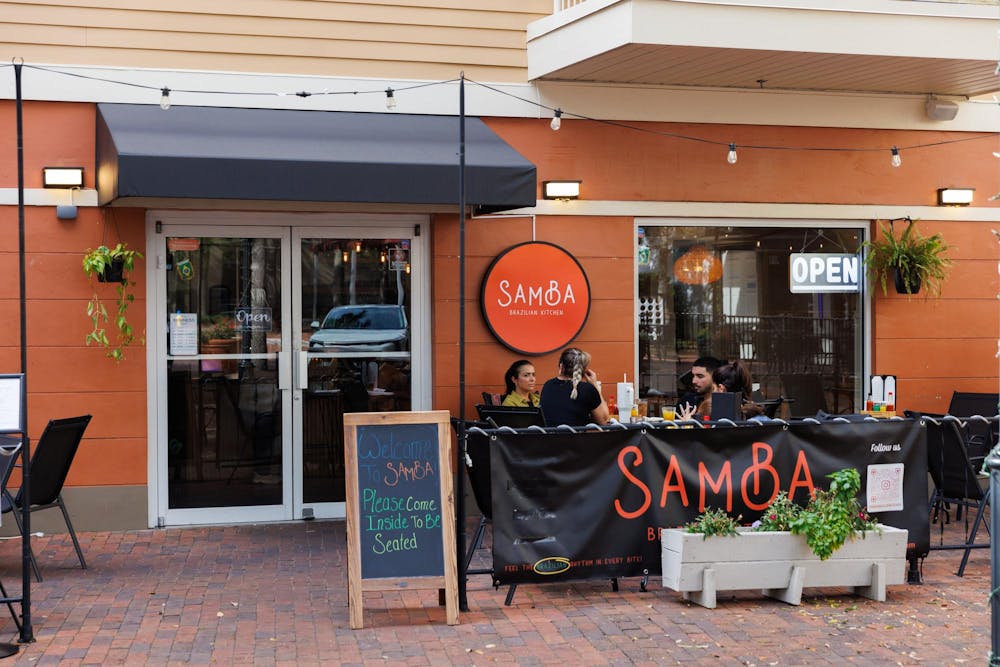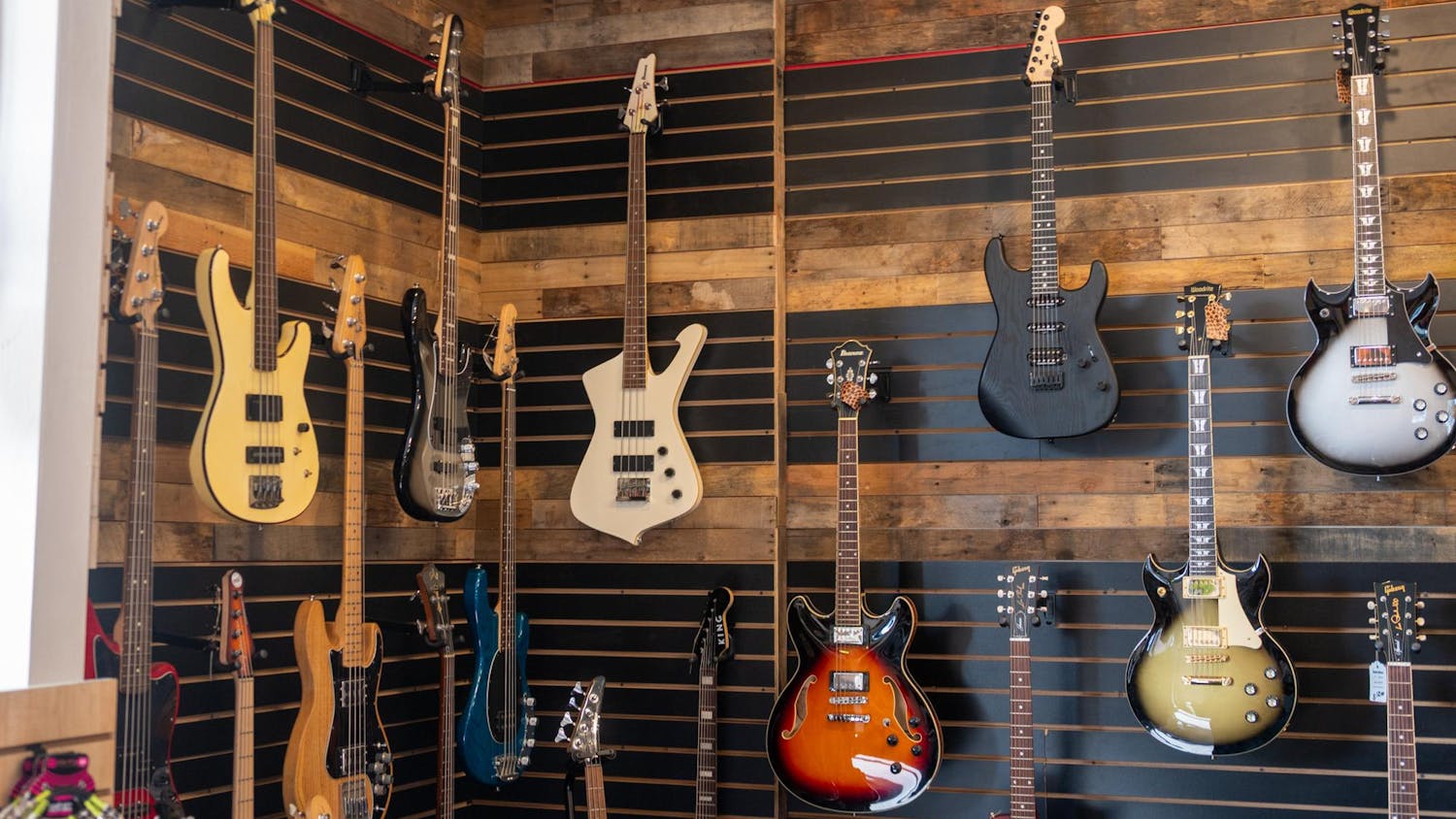Read more from The Alligator's "Ripple Effects" special section here.
While hearing Portuguese among Haile Plantation’s streets may not be common, one restaurant corner in the Haile Village Center plays Brazilian classics lightly over its speakers.
Samba Brazilian Kitchen’s courtyard is lined with string lights beaming over a handful of quaint tables. Fifty feet away sits a small playground with a swing set and a short slide, a selling point resident Elisana Elliott said contributed to Samba becoming one of her favorite restaurants.
“Samba is a gift to Gainesville,” Elliott said.
It’s the kind of place where waiters and customers know each other by name. The openness shared is the type that makes it difficult when a loyal customer expresses disappointment at food price increases. Since tariffs were imposed on Brazilian goods, Samba employees have experienced that confrontation.
In the small business world, President Donald Trump’s tariffs have put owners such as Samba’s Luiz Gonzaga into difficult decisions over the last few months.
Trump signed an executive order July 30 increasing the tariff on Brazilian imported goods by 40%, bringing the total tariff amount to 50%, because of the recent “policies, practices and actions” by Brazil’s government. Brazil’s persecution of former President Jair Bolsonaro, a Trump ally, and his supporters, the executive order said, are human rights abuses.
Bolsonaro was ordered to face trial by Brazil’s Supreme Court in March on charges he attempted to start a coup to overturn election results after his 2022 loss. He was sentenced to 27 years in prison in September, and Trump said he was “very unhappy” at the former president’s conviction.
The pressure of growing prices
Having just celebrated one year of business in September, Gonzaga said he and his fellow owners were not expecting the change. The increase is particularly difficult because the restaurant is still establishing itself.
“This uncertainty of what is going to be the next price is very detrimental for the business,” he said.
Samba opened in 2024 after a group of three married couples, who affectionately nicknamed themselves “the Bubble,” decided to take their jokes about making a Brazilian restaurant seriously. During the pandemic, “the Bubble” often discussed their shared longing for Brazilian culture and food, and they agreed Gainesville needed a restaurant.
Samba’s initial goal, Gonzaga said, was to expose people to Brazilian foods beyond just the traditional barbecue. Today, he’s found the journey personally rewarding but financially difficult. Those difficulties only increased when his business “took a hit” from tariffs, he said.
The tariffs increased the prices of Brazilian imported goods, excluding select products such as orange juice. Distributors have not passed all costs to their customers yet, Gonzaga said. So far, he estimated, Samba has already seen a price increase of 20% to 30%, depending on the product.
Gonzaga had to make difficult decisions to change the menu, including by decreasing the number of products made with Brazilian carne seca, a type of beef jerky. Samba’s menu prices also increased by 5% to 10%, but he said not all food costs can be passed to consumers. If they are, Samba may lose customers or alienate those who can’t afford more expensive products.
“We like to have a restaurant that is inclusive on the financial side to the cost of food,” he said.
If Samba absorbs all the price increases internally, however, the restaurant will suffer in the long run, Gonzaga said. The money he spends now to sustain the changes, he added, is money he would have liked to invest into the restaurant.
About 30% of Samba’s products are direct imports, he said. While some ingredients, like yuca, are replaceable, others, like the Brazilian soda Guaraná, are not.
The popular Brazilian beer Cerpa had to be pulled off the menu, Gonzaga said, much to customers’ dismay. Distributors, who buy products months in advance, do not want to commit to potential price changes, which makes it difficult to find some specialty products.
The menu changes helped prevent staffing changes, though he said it is hard to make a business plan with so much price variability.
“In the end, tariffs end up being shared by the business owners and by the consumers, and it’s something that impacts people’s lives every day,” he said.
Gainesville resident and Samba customer Shirley Campos said she has always wanted a Brazilian restaurant in Gainesville. When she was a student at UF, there weren’t any, she said.
She said Samba’s food is true to Brazil.
“[Samba] gives us a sense of community in the city,” she said, “not only to attract all the Brazilians but other local people as well.”
Campos believes increasing tariffs poses a risk to small businesses and the entire country as the value of products rise, she said.
The suppliers’ side
Suppliers of Brazilian products, too, face difficult decisions under the tariffs.
Fernanda Nogueira, who manages the South Florida-based company All Brazilian Import & Export, said the company’s market will decrease by 20% as it stops importing products because of the tariffs.
“There are some products that are going to become unsendable,” she said.
All Brazilian serves Brazilian and Latin American retail communities throughout the country, ranging from restaurants to bakeries and grocery stores. The company’s first client, Nogueira said, was Fogo de Chão, a chain of Brazilian steakhouses.
The beer Cerpa now costs her $50 per box, and, in comparison to cheaper beers such as Heineken, Nogueira said it’s no longer worth importing. All Brazilian is now passing on 20% of the added tariff costs to clients, she said, and absorbing the remainder.
To do so, Nogueira said, the company has accepted decreased profit from its sales, and All Brazilian is trying to find other international markets selling substitute products. She said tapioca flour, for example, will now be imported from Thailand instead to distribute to bakery clientele.
Fogo de Chão used to buy $5,000 worth of products per week, she said, but now purchases only $1,500 per week because of increased costs.
Nogueira oversees the company’s West Florida, Atlanta, Nashville and Dallas hubs, and she said three members of her crew were fired to cut costs after the tariffs. Now, she only has one employee in Nashville, one in Atlanta and two in Orlando. The job cuts have made her own job more taxing, she added.
She said she believes Trump and Brazilian President Luiz Inácio Lula da Silva need to make a new deal. In the meantime, the company’s focus is shifting from Brazilian products to supplying alcoholic drinks from countries like Mexico.
The Miami hub, she said, let go of all but one employee, who now manages the area’s market alone.
“Today, you end up working more and earning less,” she said.
Contact Maria Arruda at marruda@alligator.org. Follow her on X at @mariazalfarruda

Maria Arruda is a second-year journalism and political science student, currently working as the City Commission reporter for The Alligator. Previously, she reported on Student Government under The Alligator's University desk. She enjoys running, reading and going to movie theaters!






